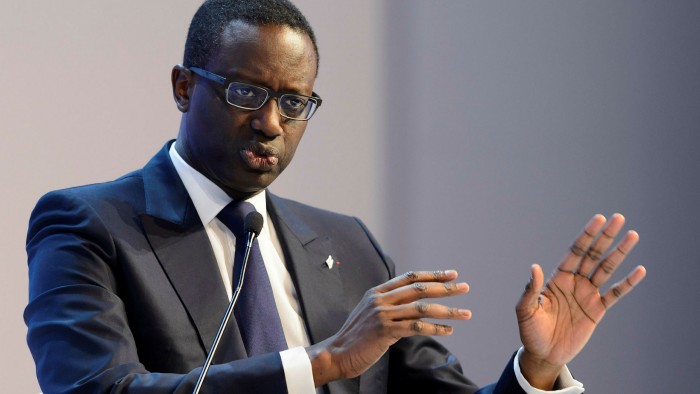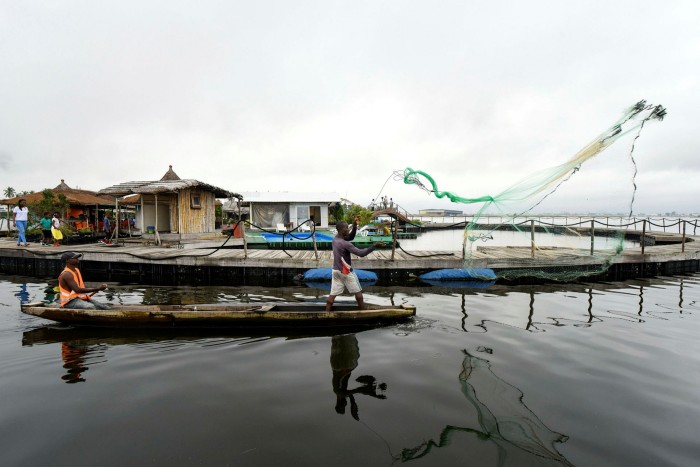Tidjane Thiam: ESG brings distinct value to developing nations

Roula Khalaf, Editor of the FT, selects her favourite stories in this weekly newsletter.
Funds that invest according to environmental, social and governance (ESG) principles have attracted net assets of more than $70bn from April to June, pushing their assets under management to a historic high of $1tn.
Suddenly, there seems to be no limit to the enthusiasm for ESG investing. In this new context, it is as ever important to not get carried away and to reflect on some of the more fundamental factors that are shaping the evolution of ESG investing over a longer period of time than the past few months.
As someone born in a developing country, there has never been much doubt in my mind that adhering to ESG principles is the right thing to do for businesses and for countries.
In my life, and particularly in Africa, I have seen first hand the consequences of non-ESG-aligned behaviours, whether the disappearance of the Ivorian primary forest, which shrank by more than 80 per cent in 40 years, or damage to the Abidjan lagoon in the 1960s and 1970s from uncontrolled disposal of chemical and human waste.
When I was in government in the Ivory Coast, the EU funded a major effort, which I led, to protect what remained of the forest and promote more sustainable cocoa growing.
Two decades on, after a lot of investment by stakeholders including cocoa farmers, the chocolate industry, the Ivorian government and local communities, the situation has started to improve.
The recognition by the chocolate industry of the importance of adhering to ESG principles has been a powerful lever. That said, the Ivorian forest continues to shrink and there are still children working on cocoa plantations. Much remains to be done but ESG is a key part of the answer.
A fundamental problem is that many developing countries have neither the clout nor the institutional framework to ensure that companies operating on their territory act responsibly.
In the Ivory Coast, a European-owned chemical company dumped its waste directly in the Abidjan lagoon for decades, devastating a unique ecosystem. Over time, the authorities strengthened the Ivorian anti-pollution regulations and their ability to implement them.

After the company was bought by Unilever, the combination of stronger local capabilities with a FTSE 100 group keen to work to ESG principles led, over time, to improved conditions. That company now operates to the highest environmental standards and generates no pollution.
The fact that investors are now increasingly supporting and rewarding responsible corporate behaviour is good news for all countries but never more so than for countries with limited resources, as is often the case in lower-income countries and in Africa.
It is also good news that the leaders of companies are increasingly embracing ESG. Individuals can make a big difference driving that change.
At Credit Suisse, when I wanted to materially increase ESG activities, I put Marisa Drew — then the bank’s most senior female banker — in charge. Passionate about ESG, she has used her credibility as a businesswoman to drive the agenda very effectively both internally and externally. She is a role model for those who want to contribute to further corporate progress on ESG.
This new focus by business will over time have a significant, positive impact on the growth prospects of less-developed countries. Particularly important in emerging and developing economies is the G — governance. Why? Because companies will invest and create jobs in countries with good governance and where corruption is not tolerated. The first victims of corruption are always the poor who end up paying more for basic services and goods.
Companies must not engage in corrupt practices or support regimes that do not respect basic human rights. Corruption and poor governance are both morally wrong and economically inefficient. Civil society and non-governmental organisations have a key role to play to denounce abuses and drive change.
All companies today know this, but some are still hesitant to fully commit to ESG as they wonder whether it will not inevitably lead to lower returns. I believe it actually can and will increase returns. Covid-19 and its cohort of sad news and challenges for our world, and our economic models, have shed some new and interesting light on this issue.
In Q1 2020, 94 per cent of ESG funds outperformed their parent benchmarks. This owed something to the fact that ESG funds were not exposed to oil and gas, carbon-intensive industries that suffered a slump in demand as a result of the pandemic. However, it seems that the outperformance continued in Q2 2020, after these stocks recovered.
For those who know some of the criteria used for ESG investing, such outperformance should not be surprising.
For instance, one of the things that ESG investing looks at closely is supply chains. Companies with long, complicated, fragmented supply chains have been hit hard by lockdowns. Companies with more local and environmentally sound sourcing have done better.
ESG also looks at how companies treat their employees, including their approach to health and welfare benefits. Companies that have treated their employees well since the pandemic started, made working from home easier and mitigated the impact of furloughs, did better financially than those that did not.
We are in the middle of a pandemic, fighting a highly contagious virus with no real treatment and no vaccine yet. But one of the worst downturns in history has also made it much clearer to many why doing the right thing may allow one to also do better.
High-quality businesses that adhere to sound ESG practices will outperform those that do not. Countries with high-quality leadership, that engage with ESG-aligned companies will do better than countries that do not.
ESG is here to stay and that is good news for all of us.
The author is chair of the audit committee of the Kering Group, member of the Group of 30, and the African Union’s special envoy on Covid-19
Comments